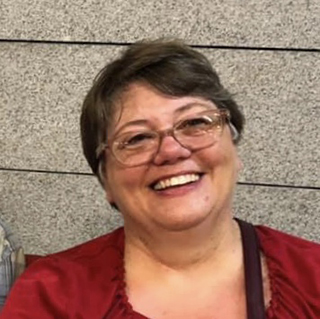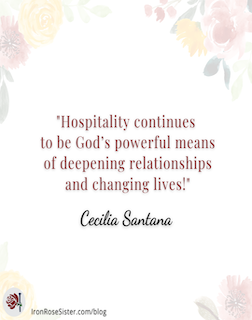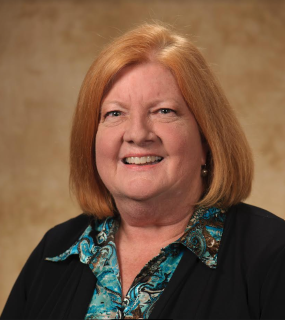-
Good Morning!
 Written by Jennifer Percell, volunteer with Iron Rose Sister Ministries in St. Joseph, MO
Written by Jennifer Percell, volunteer with Iron Rose Sister Ministries in St. Joseph, MOThe whole earth is filled with awe at your wonders; where morning dawns, where evening fades, you call forth songs of joy. (Ps. 65:8, NIV)
Good Morning Sisters! Yes, it is morning, the morning of joy. Every day that we wake up and have opportunity to praise the great God of heaven is a new morning of joy.
Several months ago, these statements would have only brought pain to my heart. My heart was wrapped in a great cloud of darkness. Not only were we isolated in a frightening pandemic, my beloved older sister was suffering a terrible illness, I had many concerns for my children, and I was suffering a difficult illness myself. There seemed to be little hope to brighten any morning.
My prayers were quite desperate in those months. Since I am bound by human perspective, I could see little chance of change in any of the situations that were weighing me down. My desperate pleas were that God would bring some change to seemingly unchangeable circumstances. Those prayers did little to comfort me though, because I could not see the possibilities. I knew God's vision was so much greater than mine, but since I could not see resolutions, my heart refused to hope.
As I write today, we are still in the midst of a frightening pandemic. My sister's illness has progressed to a terrible condition, my illness remains undiagnosed and quite painful, and I still feel great concern for my children and grandchildren. In the midst of all of this I struggle to describe my joy. The deep rivers of unquenchable joy that have overtaken me feed my hungry soul in a way I have not known in my 61 years of this hard life.
The way that God reached His great strong hands into my very being and reshaped my heart was more effective and perfect than any surgery that may attempt to heal my body. I laugh out loud at my weak perspective that believed change was not possible. Can anyone look at 2020 and feel that life does not change? The changes wrought by experiencing great upheaval seem to us to be very negative. If I could recount to you the answered prayers God gave to me through the last months, you would see—you could not help but see—His great hand on every single moment of my days. You would see, as I have seen, that when life is most hopeless is when our vision can finally clear, and the incredible, indescribable love of the God of heaven will shine in brilliant technicolor rainbows.
As you cry your tears and sob with fear, please open your eyes and see Him. See Him reaching into your heart, making tender, gentle adjustments to your perspective. I wish I could describe how it works. If I could, I would not need Him so much. Step out of your darkness and allow the warmth of His light to nurture you. My sisters, the morning is so very, very beautiful.
Read from His word right now, read how the Potter works in Jeremiah 18:4, and Isaiah 29:16 and 64:8.
Read Lamentations 3:1-59 and sing new songs of everlasting joy. How is your morning going?
-
Grace in Relationships
 Written by volunteers with Iron Rose Sister Ministries Crismarie Rivas (daughter) in Ecuador, and Johanna Zabala (mother) in Venezuela
Written by volunteers with Iron Rose Sister Ministries Crismarie Rivas (daughter) in Ecuador, and Johanna Zabala (mother) in VenezuelaWhen we talk about grace in relationships, we focus on personal, family, work, social, and friendship areas, immediately connecting them to the precious spiritual aspect because, as we know, grace would not be grace if it had not been given by God.
A clear example in scripture is the apostle Paul, who, through the Holy Spirit, speaks to the church in Ephesus and to us today, affirming that "by grace we have been saved" (Eph. 2:1-10 NKJV).
This shows us the free and undeserved favor that comes from the love and will of God toward every human being on the face of the earth. Also, it carries a series of unique characteristics of the saving grace of our Lord Jesus Christ: His love, goodness, compassion, consideration, and mercy shown to each of us.
Today, we live in a society that little knows the redeeming grace of Jesus Christ. Because of this, there is very little grace in the world's relationships.
However, for each of us as daughters of God and knowing His will through His grace given through His son, our Lord Jesus Christ, we need to demonstrate grace in relationships, especially in the family of faith. This encompasses everything: love, kindness, compassion, consideration, and mercy.
These are key elements to a genuinely gracious, single-minded relationship with Christ. This relationship leads us to practice the direct command to love one another, as indicated in 1 John 4:7, and links us to obedience to God.
To this effect, the grace of God is a divine and wonderful gift that gives us love, forgiveness, and strength to foster understanding, reconciliation, and spiritual growth that unites us powerfully.
The Bible repeatedly teaches about the application of grace in our relationships. Going back to Ephesians 1:6-7 (NKJV), we are reminded, "To the praise of the glory of his grace, by which he has made us accepted in the Beloved, in Him we have redemption through his blood, the forgiveness of sins, according to the riches of his grace." This tells us that the grace of God accepts us as we are and frees us from the burden of sin through the sacrifice of Jesus.
Likewise, grace precedes forgiveness and reconciliation. "Bearing with one another, and forgiving one another, if anyone has a complaint against another; even as Christ forgave you, so you also must do" (Col. 3:13).
Grace calls us to forgive as Christ forgave us. By forgiving, we immediately open the door to reconciliation and maturity in each of our relationships. First Corinthians 13:4-7 beautifully tells us,
Love suffers long and is kind; love does not envy; love does not parade itself, is not puffed up; does not behave rudely, does not seek its own, is not provoked, thinks no evil; does not rejoice in iniquity, but rejoices in the truth; bears all things, believes all things, hopes all things, endures all things.
So, it is great to recognize that grace enables us to be patient and tolerant in all our relationships, reflecting God's love in our conduct and actions. And it is here when grace becomes selfless service, a unique and holy act frees us to serve others with love without expecting anything in return, following the faithful example of the beloved Jesus.
Finally, grace also allows for edifying communication. Ephesians 4:29 reaffirms, "Let no corrupt word proceed out of your mouth, but what is good for necessary edification, that it may impart grace to the hearers." Sanctifying grace is also manifested in the way we communicate. As women of God, when we edify and encourage each other with our words, we show grace to those who listen to us.
In conclusion, beloved sisters, God's grace is essential in every healthy and fruitful relationship. There is an indisputable need to apply it in our personal, family, and spiritual interactions so that we can all experience the fullness of love and peace that comes from God. From now on, may this exclusive favor from the Heavenly Father inspire us to live in grace and to always reflect it in each of our relationships. Let us ask ourselves daily, “Does the grace of the Holy Spirit accompany us and unify us all the time?”
-
Great and Faithful
 Written by Sadia Morales de Mendoza, volunteer for Iron Rose Sister Ministries in Mexico
Written by Sadia Morales de Mendoza, volunteer for Iron Rose Sister Ministries in MexicoGod’s promises are wonderful and sustain me in a world that is upside down. What about you? Have they sustained you? When I have felt most alone, I have been told, "I am with you always, to the end of the age" (Mt 28:20b, ESV).
I remember when I arrived in Mexico, I was just twenty-one years old. Leaving our country of origin was not easy, but migration has always existed. Maybe you have left your city or your home for work or other plans without knowing whether everything would be okay, or thinking nothing would go the way you think. It is there that God's promises take on value and truth.
When I first arrived, I missed my family, siblings, and the church so much. It can be difficult to express what we feel when others think we are the happiest in the world because we are fulfilling a dream or a clear answer from God, but we are in a new place, scared and fearful. I remember this promise: "I sought the Lord, and he answered me, and delivered me from all my fears" (Ps. 34:4). It’s been twelve years in which His promises have been great and faithful, and they have sustained me. "For I know the plans I have for you, declares the Lord, plans for welfare and not for evil, to give you a future and a hope" (Jer 29:11). I believe and trust Him.
The sisters, brothers, elders, youth, and children of the church have become my family. I see in them part of every family member of mine. But even with them, I have sometimes felt lonely, nostalgic, and scared, like a child in the dark of night, waiting for my mom to turn on the light and kiss me on the forehead. But since she can't because of the distance between us, even though I know she won't stop praying for me, I turn to the one true God who can be here with me as well as with her in Honduras. I am reminded of Psalm 121:4-5. "Behold, he who keeps Israel will neither slumber nor sleep. The Lord is your keeper; the Lord is your shade on your right hand.”
And we are given another promise: "And the peace of God, which surpasses all understanding, will guard your hearts and your minds in Christ Jesus" (Php 4:7). If He's done it for me, He'll do it for you.
So, even if your path is difficult—you are changing cities, you are leaving your home country, or you are starting over in a place to which you are adapting—the Lord Jesus will sustain you. He will guard your coming and your going from now until forevermore. And He'll fight for you. So do not turn away from Him, either to the right or the left. Keep on the path, and He will guard your soul. Believe in His promises! Be faithful, for He is faithful; and let us clothe ourselves in love, which is the perfect bond.
God can turn difficult situations into blessings and our bitterest experiences into a sweet testimony of His grace and power. Let us give thanks that His promises sustain us, and in them, we will forever trust.
His promises are many, but which one has been your favorite in the different stages of your life? Can you recognize any?
May the Lord bless your life. He will always keep His promises. Don't stop believing Him!
-
Growing Through Struggles
 Written by Deanna Brooks, volunteer with Iron Rose Sister Ministries in Arkansas
Written by Deanna Brooks, volunteer with Iron Rose Sister Ministries in ArkansasStruggles… life can be hard. We can plan, but then something happens that shatters those plans, and it is not always because of something we have done that our plans did not work as we expected; often it is something over which we have no control.
So, where does that leave us?
We can be angry and bitter, or we can try again. It’s easy for someone to say, “Pick up the pieces and move on.” It’s harder when I am the person picking up the pieces and trying to make the best decision about what to do next when it seems every way is blocked.
It took Thomas Edison 2,774 tries until he got the right filament for the light bulb—one that would burn for more than a few minutes.
When an assistant complained they were learning nothing, the reply was, “Oh, we have. We’ve learned over 2,000 ways that don’t work.”
Can we imagine a world without the light bulb? It’s something we take for granted… as a necessity… but how different would our lives be if he had given up?
Having a positive attitude in looking at what might be considered a failure will help us work through the problem.
When a butterfly emerges from the chrysalis, it struggles. Its wings are weak and wet, but it is in breaking through those strands of silk that the wings gain strength, allowing it to fly. If someone tries to help by cutting the silk threads of the chrysalis, the butterfly will die within minutes. It needs the struggle to be healthy.
It is in our struggles that we grow… even when we don’t like the process.
Romans 5:3-5 (ESV) reads,
Not only that, but we rejoice in our sufferings, knowing that suffering produces endurance, and endurance produces character, and character produces hope, and hope does not put us to shame, because God’s love has been poured into our hearts through the Holy Spirit who has been given to us.Suffering… endurance… character… hope.
Financial struggles can make us more compassionate toward those who have less than we do and help us learn to budget.
Health struggles make us thankful for medical care and for better health when it comes.
Relationship struggles help us appreciate those friends or relatives who encourage us.
Think about the struggles some of those in the Bible experienced:
Noah and his family lost everyone they knew in the flood. When the door of the ark was opened, they stepped into a world where there was no one else.
Sarah was barren, longed for a child, and was mocked by her handmaiden.
Naomi lost her husband and both sons while living in a foreign land.
David found himself in a dark place, far from his shepherd days and glory as king after taking another man’s wife.
Elijah was hated by Jezebel and fled after a “mountain top” experience on Mt Carmel.
Daniel was one of numerous young teens captured and taken to a foreign land… away from family and friends.
The apostle Paul tells of his struggles in 2 Corinthians 11:24-29, yet he was still able to write,
“We are more than conquerors through Him who loved us” (Rom. 8:37).
“The Lord is faithful. He will establish you and guard you against the evil one” (2 Thes. 3:3).
The writer of Hebrews gives this assurance, “He who promised is faithful” (Heb. 10:23).
We belong to the Father, and Jesus is interceding for us. When struggles come, we need to remember the words written long ago by David, “The LORD is on my side; I will not fear. What can man do to me?” (Ps. 118:6)
We have the assurance that God is faithful, that Jesus is our Advocate, and that the Spirit lives in us, so let’s use these struggles to live as “children of Light”! (Eph. 5:8)
-
Growth Through Struggles
 Written by Claudia Pérez, volunteer with Iron Rose Sister Ministries in Alabama
Written by Claudia Pérez, volunteer with Iron Rose Sister Ministries in AlabamaWhat happens when a Christian and her faith are tested in times of struggle? Who has not experienced difficult situations? Truth be told, we have all had struggles at some point. In those moments of uncertainty, we ask ourselves, “Why me? What should I do with this struggle?” instead of asking ourselves, “Why is this happening to me? What am I going to learn from this?” or even “Why does God allow us to have these struggles?” Maybe we think that in our lives as His daughters, we will only have paths that are filled with light and that are colorful and beautiful.
The reality, however, is that it is through these struggles that the Lord's purpose is fulfilled in our lives. A global pandemic showed us this.
Two years ago, many of us fought a fight that completely changed our lifestyle. Locked up, without contact with each other, grandchildren were looking for a way to hug their grandparents through transparent curtains, masks, and gloves. Screens became the only contact in the family, school, and work. All physical contact was prohibited. The church was affected worldwide. And in that struggle, many of us asked, “Why, Lord?”
In those moments of struggle, many forgot the word of the Lord, “Who shall separate us from the love of Christ? Shall tribulation, or distress, or persecution, or famine, or nakedness, or peril, or sword?” (Rom. 8:35 KJV).
In those moments of struggle where our God tested our faith, many became stronger, and sadly, others went astray. Two years ago, I was in a hospital in Mexico in the COVID area, isolated from everything and everyone. The only thing that sustained me was my faith; that faith that makes us strong in our weaknesses and that hope of eternal life. I was trusting that my spiritual family was praying for me. It was not an easy fight. There were weeks of strengthening myself in the Only One who can make us strong. These were weeks of uncertainty, and it was in those moments when the word of God strengthened me. Without access to anything, with nurses and doctors that God put in my path, and with confidence in the promises of the Lord in my mind, I remembered those hymns of encouragement, strength, hope, and trust.
I remembered the words of the apostle Paul,
“For whether we live, we live unto the Lord; and whether we die, we die unto the Lord: whether we live therefore, or die, we are the Lord's” (Ro. 14:8).
The day finally came when the will of the Lord was fulfilled and I left that place, more strengthened than when I entered, with the sole purpose of continuing to fulfill His command, “Go ye into all the world, and preach the gospel to every creature” (Mk. 16:15). In those moments of struggle my faith grew even more.
I remembered 2 Corinthians 12:9-10.
And he said unto me, My grace is sufficient for thee: for my strength is made perfect in weakness. Most gladly therefore will I rather glory in my infirmities, that the power of Christ may rest upon me. Therefore I take pleasure in infirmities, in reproaches, in necessities, in persecutions, in distresses for Christ's sake: for when I am weak, then am I strong.
Clinically, my diagnosis was not encouraging at all. But the Lord says, “Why art thou cast down, O my soul? and why art thou disquieted within me? hope thou in God: for I shall yet praise him, who is the health of my countenance, and my God” (Ps. 42:11).
Maybe you are going through a struggle right now. Ask yourself, “What am I living this for?” Remember that He will complete His work in you. God has a purpose for our lives. And, it is through struggles that our faith is tested by fire. “That the trial of your faith, being much more precious than of gold that perisheth, though it be tried with fire, might be found unto praise and honor and glory at the appearing of Jesus Christ” (1Pe. 1:7).
So, if you are going through a difficult time, I invite you to trust Him, honor and glorify Him who can do everything in everything— because when we are weak, then we are strong.
-
Hannah’s Transformation
 Written by Débora Rodrigo, volunteer with Iron Rose Sister Ministries in Arequipa, Perú
Written by Débora Rodrigo, volunteer with Iron Rose Sister Ministries in Arequipa, PerúAll the women around her were mothers. Being a mother is what gave a woman of her time and her culture her reason for being, her value in the family and in society. But Hannah had no children. Hannah was empty. She was alone. She felt useless. A waste of society. Good for nothing. Her husband could not understand that feeling of helplessness that devastated her heart. He asked her, why do you need a child? Am I not enough for you? But of course, he had his own children; another woman had given them to him. She was unable to do it. She felt watched, singled out. When she walked through the streets, she felt how other women looked at her with pity. She knew what they were thinking. There was Hannah, the one who couldn't give her husband children. The one who would never feel the baby kicks in the womb, the one who would never breastfeed her children. Some women made fun of her. We do have children. Not like you. Something must be wrong with her. Or at least that's what she felt.
The anguish grew with the passing of time. The chances of the miracle occurring diminished considerably as the months progressed. The years continued to pass without stopping. Hope was diminishing. Impotence grew, and along with, it desolation. Little by little Hannah’s heart filled with anguish. Loneliness. Bitterness. No one could understand how she drowned the deep weight of sadness. It was impossible to explain. There was no way for others to understand this terrible bottomless tunnel that Hannah walked through every day. Alone.
Like every year, Hannah, along with her husband, who was also accompanied by his other wife and the children she had given him, traveled to the Shiloh sanctuary to worship God. It was a family custom, an appointment they didn't miss. But this year Hannah was traveling completely devastated with hardly any energy, without even the courage to feed her own body. Upon arrival, she could do nothing but retire to the sanctuary and pray to God from the silence of her solitude. She needed to free herself from that deep sadness. Soundless words came out of her mouth and mixed with the tears that flowed from her eyes without rest. There, in the midst of her loneliness, Hannah poured out her heart before God. She emptied it completely. She begged Him to take such a heavy load. There, Hannah finally felt understood. As her prayer flowed, a vibrant energy strengthened her body and soul. Finally, little by little, Hannah allowed the sadness to leave her mind and her being, emptied of the anguish that had taken possession of her for so long. Hannah let God give her encouragement and even joy in the midst of her terrible suffering. Anyone who saw her like this, completely abandoned in the arms of God, would have considered her crazy, or even drunk, as the priest himself thought she was. But she was just a devastated woman surrendering to a God who loved her and understood her suffering. The only one who could comfort a heart as broken as hers.
After praying for a while, Hannah wiped away her tears, got up and went back to her family. But this time with renewed strength, without the heavy burden of the abyss of sadness. Her appetite returned and she felt motivated enough to keep going. God had comforted her heart. At last, the heavy burden of sadness had become more bearable, and even light. Although her desire for a child was still just as strong as before, that suffering was much more bearable. She knew she wasn't alone. She knew she was loved and understood.
Only a few years passed before Hannah returned to that same place and stepped on that same ground that had seen her cry inconsolably and find the comfort she needed. This time however, the tears were of joy. The words, inaudible one day, were now clear and firm, the phrases that before implored help, now gave exclamations of gratitude and joy. Gratitude for that son that Hannah now embraced. Joy for a heart that found in God the hope it had lost. That son that she had felt growing within herself belonged to God and she gave him to God. God had replaced her anguish with inordinate joy. Now she felt complete, overflowing with joy.
#IronRoseSister #HIStories #Hannah #motherhood #sadnesstojoy #guestwriter
-
Hearing the Angels Sing
 Written by Meagan Adams, volunteer with Iron Rose Sister Ministries in McRae, AR
Written by Meagan Adams, volunteer with Iron Rose Sister Ministries in McRae, AROne of my favorite Christmas songs is It Came Upon the Midnight Clear by Edmund H. Sears. If you sing more than the first verse you realize that it’s not exactly the cheeriest holiday song. There is a poignancy to it, but also a call to something better. In the second stanza, Sears describes a scene where the angels are still singing their song of “Peace on the earth, good will to men from heaven’s all gracious king” but it goes largely unheard as it competes with the earth’s “Babel sounds.” In many ways, 2020 was a year of “Babel sounds” – confusion, conflict, uncertainty. It felt like all progress stopped and we all just ran around with no agreement on how to get anything done. Mankind’s perceived invincibility to accomplish anything it wanted was quickly derailed by a virus.
The third and fourth stanzas of Sears’s poem are the least-often sung. In years past, I focused on the third stanza:
Yet with the woes of sin and strife
The world has suffered long;
Beneath the angel-strain have rolled
Two thousand years of wrong;
And man, at war with man, hears not
The love-song which they bring;
O hush the noise, ye men of strife,
And hear the angels sing.This verse reminds me that there is a different reality than the world that I see. I wake up to my phone’s alarm and the first thing I see are news notifications of all that is going wrong in this world. It’s easy to get discouraged by it and to be frustrated that after all God went through to try to show us the way of peace and harmony, the world as a whole won’t listen. But that is not all there is. The angels continue to sing God’s love song – His message outlasts the futile and destructive behaviors of mankind.
This year, however, the fourth verse spoke to me:
And ye, beneath life’s crushing load,
Whose forms are bending low,
Who toil along the climbing way
With painful steps and slow,
Look now! For glad and golden hours
come swiftly on the wing,
O rest beside the weary road,
And hear the angels sing!In the past, this seemed only to apply to the oppressed people of the world, and I know that I am among the privileged. I haven’t had to experience ongoing, overwhelming injustice and hardship. Still, if anything describes the 2020 experience, words like “crushing,” “toil,” and “weary” seem to be apt descriptors. The force of the coronavirus-world weighs down on my shoulders, life seems an uphill climb, and my steps are slow and painful (both literally & figuratively!). Hmm, seems like somebody else needs to listen to God’s song, to reframe my view of reality. I need to heed the call to take a break from weariness, to rest in God’s presence, and to let God’s music fill me. I need to listen to the angels sing.
-
Hindrances to Listening
 Written by Kristi Bond, volunteer with Iron Rose Sister Ministries in Arkansas
Written by Kristi Bond, volunteer with Iron Rose Sister Ministries in ArkansasTherefore, since we are surrounded by such a great cloud of witnesses, let us throw off everything that hinders and the sin that so easily entangles. And let us run with perseverance the race marked out for us. (Heb 12:1 NIV)
We learn a lot just from growing old. Aging brings with it a host of ailments that challenge our physical capacities. Although it’s not unheard of, it is rare for 80-year-olds to run races. My back problems can attest that aging is not always fun! But one of the worst problems I have had in recent years has to do with my ability to hear.
A few years ago, I began to experience brief periods of hearing loss. My ears felt full, and I struggled to hear voices, especially my husband’s low voice. These sensations would last anywhere from three days to three weeks, until last year I lost low-range hearing in my left ear for four months. At work, I had to strain to hear my students. Sitting right next to my husband in the car, I often didn’t know he had spoken to me. And at church, it became hard to praise God with my brothers and sisters because my own singing was all I could hear. The audiologist explained that my ears were producing an internal fluid that impacted my ability to hear and that these episodes would come and go, but get worse with time. My ears are working against me!
Sometimes, we are our own worst enemies. This is especially true when it comes to listening. Our priorities and desires hinder us from hearing others. Sin and self-absorption create an internal fluid that blocks out any sound other than our own voice, and we stop listening for the needs of those around us. It’s easy to lose our focus on what God is trying to tell us. We seek pleasure or rest in things other than God, or we lean into our anger, anxiety, or resentment. These periods of hearing loss can be brief, or we can spend a lifetime ignoring God in favor of our emotions or desires.
Hebrews 12:1 tells us that we are running a race. We have the advantage of a running coach who lives within us—the Spirit of the living God. Are we letting our priorities keep us from hearing Him? Is our sin quelching the Holy Spirit? Daily training is available through the Word of God. Are we able to hear His instructions?
Jesus frequently says to His listeners: “He who has ears to hear, let him hear.” Our relationship with God suffers when we listen only to our own desires. Let’s be Christ-followers who have ears to hear!
We often think of running as an individual sport, but we should not underestimate the importance of knowing our fellow runners. I watched a race in the Olympics this year where one runner accidentally tripped up another participant, and both runners fell and were disqualified. How tragic for those who have trained so hard to get to the race of their dreams! We don’t want to be so self-absorbed that we cause ourselves and others to fall. Put another way, when all we can hear is ourselves, we can’t hear each other. If we are to “run with perseverance”, we will need to encourage and be encouraged by our fellow runners.
As I grow older and experience more and more hearing loss, it takes more effort to listen. I refuse to withdraw inside myself, though. Instead, I will actively seek ways to worship, interact, and connect with others despite the disease I am experiencing. Jesus healed a deaf-mute by touching his ears (Mk 7:31-37), and He can open my ears too – both physical and spiritual. I pray that He will remove the sin and selfishness that keeps me from hearing Him and others as I actively seek to listen.
In what ways can you listen more actively to God this week?
-
His Purpose Defines Our Purpose
 Written by Naijuvelin Diaz, volunteer with Iron Rose Sister Ministries in Venezuela
Written by Naijuvelin Diaz, volunteer with Iron Rose Sister Ministries in VenezuelaI know that you can do all things; no purpose of yours can be thwarted. (Job 42:2 NIV)
Many are the plans in a person’s heart, but it is the Lord’s purpose that prevails. (Pr 19:21)
But the plans of the Lord stand firm forever, the purposes of his heart through all generations. (Ps 33:11)
Acknowledging God's absolute power and dominion over mankind affirms His magnificence and sovereignty; no thought is hidden from Him.
The Word says that what God wills, He does; and all things work together for good.
Acknowledging God has control over all things affirms that nothing is beyond His reach. When we recognize His all-fulfilling dominion, we humbly activate the obedience that molds us and orders our steps by clarifying His purpose for us. We can discern His purpose and define our own, for it is He who puts the will and the doing on our timeline. Consider the attitude of Mary, the mother of Jesus, as shown in Luke 1:38, when she said, ""I am the Lord's servant . . . May your word to me be fulfilled," accepting His dominion and counsel. Through her example, I learn that for God to define His purpose it is necessary to accept His will.
For us to enjoy such great salvation, Mary had to make a firm and positive decision in response to the divine plan. She said yes, opening the possibility of that eternal purpose being fulfilled in her. How important it is to open the way for God to act on our behalf (Ps 138:8). It is a way of getting involved in the commitment we have made.
"God is not the God of nonsense," a sister friend with whom I shared pleasant moments meditating and praying told me, “Because what God wants, He does." This is the phrase that strikes me the most. When I experienced my mother's departure from this earth, I clung very tightly to the quote from Romans 8:28 when the whys came to my mind, and the Word comforted me with this: "All things work together for good." At the time, I still did not understand what that good was. Personally, I understood that for her to have left with faith in the Lord was great gain and that, for me and the rest of the family, brought strength and comfort because we were rooted in the faith and hope of those who leave with God. God glorified Himself; I saw it when a family member was converted to Him; I understood then how God worked His purpose amid both sorrow and comfort.
Another example to consider is that God established a purpose when He created us in His image and likeness. However, it is up to each person to recognize and act on it. I can define God's purpose when I am a reflection of willingness and submission to Him, abandon myself into His hands, trust, and obey Him.
His counsel for eternity is immutable. Trusting in His divine plan can strengthen you in every situation. Waiting on His promise can transform darkness into light. The psalmist suggests that we entrust the way to Yahweh; our longings, our thoughts, and our hope in Him, trusting that the best response is the one He has defined.
We have the freedom to make plans and goals, without considering what God has designed, or simply not seeking His guidance. Is it convenient for me or not? Will God agree? How does God see this within His plans? Will He like it?
Yet, entrusting all your plans to Yahweh will bring positive results to your life. He will affirm your thinking, that is, confirm what you should do. When we have a close relationship with God, we get closer to His purposes and can discover what they are. However, you must consider continually seeking Him, and He will make you understand the way you should walk (Ps 32:8).It is through deep connection in prayer and meditation on His Word that we can discover and define His purpose. How ways can you define God's Purpose in you?
-
Holiness: A Separate, Not Perfect Life
 Written byLiliana Henriquez, volunteer with Iron Rose Sister Ministries in Bogota, Colombia.
Written byLiliana Henriquez, volunteer with Iron Rose Sister Ministries in Bogota, Colombia.When you first heard this verse, "Be perfect, therefore, as your heavenly Father is perfect" (Mt 5:48 NIV), what did you think? Did you associate it with "always behaving well"? I don't remember exactly what I thought, but I probably would have had the same thought. That's a pretty simplistic view of what Jesus really meant.
Today, after several years following Jesus, I realize that holiness is not a destination that we arrive at and remain, but a path that we travel day by day. From experience, I am convinced that holiness is a process of transformation whose goal is to make us ever more like Christ: in His actions, in His way of thinking, of treating others, and of living in obedience to the Father's will. In other words, God perfects us little by little, from glory to glory.
What does this imply?
It implies that we have a lot of work ahead of us. The version of us when we started this race cannot be the same as the one that ends it. We should come to the encounter with Christ as transformed women.
What can we do?
- Recognize that following Christ has a cost.
Jesus was clear: following Him means giving one's whole life to Him (Lk 14:25-33). We no longer command ourselves; we have voluntarily decided to let ourselves be guided by Him.
- Obey with submission and love.
If we already recognize that the Father's will is our priority, then we must surrender to Him with trust and love.
- Cultivate an intimate relationship with God.
We are soldiers in an army commanded by God. To fulfill our purpose, we need to hear His instructions and be in tune with Him through prayer, the Word, and constant fellowship.
It is easier said than done.
However, as the saying goes, “Practice makes perfect.” If we want to be women of faith and holiness, we must practice, practice, practice... until our character is strengthened and it becomes more natural for us to bear the fruit of the Holy Spirit in any of its nine "tastes": love, joy, peace, patience, kindness, goodness, faithfulness, gentleness, and self-control (Gal 5:22-23).
It's not going to go perfectly on the first try. But if we continue to strive with the help of the Spirit, we will be holy as He is holy.
I encourage you to keep moving forward, you're doing well!
-
Homecoming Celebrations
 Written by Jennifer Percell, volunteer with Iron Rose Sister Ministries in Missouri
Written by Jennifer Percell, volunteer with Iron Rose Sister Ministries in Missouri“He hasn't texted in two years. She has convinced him that he doesn't need me. How can he just forget his own mom?”
“Oh, Sarah, I'm so sorry, I know we are never supposed to give up, but I feel the same way. At least my girls still text but it's nothing like it used to be. We were so close and now we are strangers. Did your son have faith?”
“He led the youth group—he even planned to be a youth director. But she is not interested so he just quit.”
“Same with the girls—they were both so faithful—now they say my faith makes me unsafe! Don't they remember I was the one who taught them that family is their safe place and that I would love them no matter what?”
Sarah and I had this conversation every week. Our friendship had bonded over pain for our prodigal children. Her son's fiancé told him his family was toxic. Sarah had no idea why, and his betrayal of their relationship had left her broken. We tried to encourage each other but neither of us could see a path to reconciliation with our adult children. So many of our friends had similar stories; lonely mothers unable to navigate new definitions of relationship expectations.I often ask God to answer my prayers with a story I could tell that would encourage others and glorify Him. I had no stories for Sarah because my own pain had clouded my hope. There was no way I could see that her son would change his heart. It seemed that the only kind thing would be to help Sarah accept a life without him, just as I was trying to resign myself to the new reality of the loss of my daughters’ faith and close friendship.
Two years passed; each week we shared tears, prayers, and sorrows. When one of us had a strong week, we would feel hopeful, but our tears were far more common. I wanted to be a faithful friend— the one who never gave up and always left her feeling comforted and sure of God's blessings, but I was not confident. I saw no solution for either of us—no way for the lost relationships to heal.
But God...
Sarah's smile was radiant as we talked last month. She showed me a picture so full of life and joy that I could not contain my tears. In the picture, she cradled a newborn grandson. Two more years had passed, years during which God had written a redemption story in Sarah's life: a story with chapters of tragedy, fear, timid efforts to connect, love that wouldn't quit trying, and open arms of forgiving welcome. Chapters no one expected. Chapters only God saw coming. The story concluded with Sarah's home and arms full again. Her son has a new love, forgiveness has been sought and given, and new life has come to this family. All of them are open to growing in faith. Hope now radiates in my friend Sarah.
Now as I share joy with Sarah, my own hope is revived. Just last week another mother who endured years of fear for her prodigal children shared the story God wrote in their lives and the reconciliation they are enjoying. It is so easy to see the pain around us, but sisters, we are also surrounded with redemption. Our God is the God of reconciliation who desires that all men come back to Him. As we share our pain, let us remember that all hope for resolution of that pain lies in a perfect, benevolent, Father who cares for our erring children even more than we do. Because of this, let us never give up praying for the souls of our loved ones.
Hear the words of living active faith from Romans 12, verses 11, 12, 15, and 21:
11. Never be lacking in zeal, but keep your spiritual fervor, serving the Lord.
12. Be joyful in hope, patient in affliction, faithful in prayer.
15. Rejoice with those who rejoice; mourn with those who mourn.
21. Do not be overcome by evil, but overcome evil with good. (NIV)Dear sisters, are you waiting for a dear prodigal to return, or are you a prodigal afraid you won't be welcomed home? Please remember what I have forgotten too many times—absolutely nothing is impossible in the hands of our Great God. He is the God of reconciliation, and right now, as you are waiting, He is writing a story of love just for you.
-
Honest Words from a God with Integrity
 Written by Beliza Kocev, Brazil Coordinator for Iron Rose Sister Ministries
Written by Beliza Kocev, Brazil Coordinator for Iron Rose Sister MinistriesAll you need to say is simply “Yes” or “No”; anything beyond this comes from the evil one.
(Mt 5:37 NIV)I was baptized in my late teens and was the only Christian in the family. I have a brother who is 12 years younger than me and I would take him to church on Sundays. At one worship service when my brother was four years old, he was having difficulty staying silent during the Lord’s supper and the offering... So I said, “If you don't stay quiet, we're going home!”
A dear brother, who helped me a lot in my Christian journey, turned to me and said quietly so my brother wouldn't hear, “Are you really going to go home if he doesn't keep quiet?” I replied no. He guided me on the importance of keeping my word, if I say I'm going to do something, I need to do what I committed to.
See, my intention wasn't bad; I was an inexperienced 16-year-old trying to get my brother to be respectful during the service. But I knew I wasn't going to do what I said.
One of the most amazing things about God is that He does what He says! “See, the former things have taken place, and new things I declare; before they spring into being I announce them to you” (Is 42:9). Prophecies give us confidence that just as He fulfilled what He promised the people of Israel, He will also fulfill what He promised us. Imagine experiencing the difficulties of being a Christian and striving to do God's will, denying yourself, without being sure that we can trust what He promised us!
God has integrity. Integrity is a moral principle. Having integrity means all your actions and decisions are consistent and honest. We can trust what He says, “For the word of the LORD is right and true; he is faithful in all he does” (Ps 33:4).
Some characteristics of God that show us that His words are honest:
- God is True.
God is true; He is truth itself. God is absolutely trustworthy and true in everything He does.
God is not human, that he should lie, not a human being, that he should change his mind. Does he speak and then not act? Does he promise and not fulfill? (Nu 23:19)
We know also that the Son of God has come and has given us understanding, so that we may know him who is true. And we are in him who is true by being in his Son Jesus Christ. He is the true God and eternal life. (1 Jn 5:20)
- God is Faithful.
God is absolutely trustworthy. His words don't fail. He shows His faithfulness by keeping His promises. He never breaks a contract between Himself and His creation.
Know therefore that the LORD your God is God; he is the faithful God, keeping his covenant of love to a thousand generations of those who love him and keep his commandments. (Dt 7:9)
For great is his love toward us, and the faithfulness of the LORD endures forever. Praise the LORD. (Ps 117:2)
- God is Unchanging.
God's attributes are unchangeable— He does not change— He is not uncertain or inconsistent. He is perfect. His consistency makes His promises firm, bringing us security and hope.
Every good and perfect gift is from above, coming down from the Father of the heavenly lights, who does not change like shifting shadows. (Jas 1:17)
I the LORD do not change. (Mal 3:6a)
- God is Infallible.
Infallible means that He does not fail— does not make mistakes. As God is perfect, He does not fail!
Now to him who is able to do immeasurably more than all we ask or imagine, according to his power that is at work within us. (Eph 3:20)
I know that you can do all things; no purpose of yours can be thwarted. (Job 42:2)
My desire is that you dedicate yourself to studying the Bible more and more to discover the wonderful words of God—words of love, guidance, encouragement, comfort, and blessings— but mainly the words that bring salvation, those that introduce Jesus, our Lord and Savior, and the only way to eternal life.
-
Honest Words of Integrity
 Written by Keren Soraia, volunteer with Iron Rose Sister Ministries in Santa Rita do Passa Quatro, Brazil
Written by Keren Soraia, volunteer with Iron Rose Sister Ministries in Santa Rita do Passa Quatro, BrazilOur Lord says, “Then you will know the truth, and the truth will set you free” (Jn 8:32 NIV). I know this passage is talking about the gospel which gives us salvation and eternal life, but I also believe that it can be applied like this: when we speak the truth, we are free from the possible consequences of sin. When we find someone who tells us the truth, even if it is difficult to hear, we know that we can trust them. Therefore, when we speak the truth, we become trustworthy people.
I thought many times about how to approach this subject — what to say, how to say it. After all, talking about truth is not something our human nature is used to, instead preferring to hide behind lies or omissions, leaving us with the feeling that it is “better this way.” If I lie or omit this fact I won’t have to deal with that person or problem. Our life seems “easier” this way and we don’t notice the resulting problems and consequences. When we do notice, the lie is already a snowball so big that we have no way out other than to resolve the issue and bear the consequences.
Once at my old job, we received a large order for meat. I noticed that this order was taking a long time to come out, and if it was left in the freezer too long, the meat would freeze. Because I was not the supervisor at the time of this order, it was not my problem (yet). But when the part of my shift came when I took over as supervisor, guess what was still in the freezer: the meat. Minutes later, there was an angry customer on the phone. My boss asked what was happening, why the order hadn't been delivered, and an assistant manager asking what he was going to do, why the meats were frozen, and pointing out that if the customer canceled the order, the meats were going to be unsuitable for sale. I thought: what now? Why didn't I say anything—why didn't I resolve it at that time?! Even if it wasn't my responsibility, if I had resolved it, I wouldn't be going through this now. My consequences: stress, a warning, and personally paying for one of the meats that the customer didn't accept.
In the scriptures, we find these passages:
Again, you have heard that it was said to the people long ago, “Do not break your oath, but fulfill to the Lord the vows you have made.” But I tell you, do not swear an oath at all: either by heaven, for it is God’s throne; or by the earth, for it is his footstool; or by Jerusalem, for it is the city of the Great King. And do not swear by your head, for you cannot make even one hair white or black. All you need to say is simply “Yes” or “No”; anything beyond this comes from the evil one. (Mt 5:33-37)
Above all, my brothers and sisters, do not swear—not by heaven or by earth or by anything else. All you need to say is a simple “Yes” or “No.” Otherwise you will be condemned. (Jas 5:12)
These passages talk about similar things such as not swearing by anything and especially by God, and that our yes should mean yes, and our no should mean no. I can't tell you how many times my mother quoted this text to me. I can still clearly hear her. At that time, I didn't understand why. But now I understand: my mother was using the scriptures to teach me about honesty and integrity. She taught me that if I said yes, it should mean yes, and that I should always keep my word so that I would be taken seriously.
Today, being honest and having integrity are such uncommon virtues that when we meet someone like this, it's unusual. They are laughed at, called naive, or told that they don't know how the world works, but that's how Christ calls us to be! We must be honest and have integrity not only concerning money, but with people, feelings, prayers, and especially in our relationship with God.
Having integrity and being honest and true to ourselves frees us from the bonds of sin and the fears that life brings, ready to be filled with the grace and love of God, and it prepares us to pass this grace and love on to others. After all, Christ interacted like this with everyone He met while He was on earth.
Are you and I willing to open our hearts, being true like Christ was?
-
Hope Brings Us to Christ
 Written by Johanna Zabala, volunteer with Iron Rose Sister Ministries in Venezuela
Written by Johanna Zabala, volunteer with Iron Rose Sister Ministries in VenezuelaHope is an important part of the richness of the human heart, as it prepares us for the spiritual fruits of patience, faith, and peace. This means that, when thinking about hope, it ties us to faith and the love of God which are preciously linked.
When I think about hope, I feel like God’s heir through the firm conviction that there is eternal life (Tit. 3:7). This motivates me, through the Holy Spirit, to overcome difficulties and all kinds of obstacles that arise in this earthly life, thus living out total consecration to God.
Daily, we observe a society in turmoil due to so much evil, suffering, adversity, and problems. I believe this has caused many people to lose hope, not recognizing true hope in the Author of salvation, Jesus Christ (Heb. 12:2).
With this in mind, I would like to share an example of the current situation that we live in my country, Venezuela. Day after day, people suffer from the economic crisis: lack of sources for work, electricitye rationing by the State (between 2 to 4 hours a day), lack of basic food in many homes, including Christian homes. There are health care centers in poor condition, declines in the educational system, deterioration and lack of attention in various State institutions, and repression and persecution of anyone who opposes the government system.
Each of these situations has forged in us the spiritual character and the understanding that we should not put our trust in a political system or an earthly power, nor in the things we see or surround us since if we do, we will lose out conviction and hope of how real the promise of eternal life is. This situation has strengthened my spiritual life as a daughter of the Most High God, by trusting in His will at all times and having that intimate relationship with Him through prayer and study of His Word, allowing the Holy Spirit to guide me to live in the spiritual and to do the will of God, with the peace and quietness of spirit that only He can give me (Rom. 5:1-5).
I should not put my hope in the things of this world (1 Co. 15:19). In my opinion, hope is certainty in the present and a firm expectation for the future, keeping our eyes fixed on Jesus Christ. It is for this reason that I emphasize lovingly bringing the hope of eternal life to everyone who is hopeless, and preaching to them the glorious gospel of our Lord Jesus Christ for the salvation of their soul.
When I begin to experience and understand God's plan and purpose in my life, I develop a deep relationship with Christ. I trust in His will, and I begin to take firm steps even in the midst of storms, for we were called to one hope (Eph. 1:18). Beloved sisters, we must understand that hope is a bond and an essential element that allows for a spiritual transformation, strengthens our faith, and gives us security and confidence in the power of God.
I encourage you not to lose hope because it brings spiritual blessings to our lives and the lives of our families, reflected in the following ways:
1. It leads us to praise and glorify God.
2. It causes us joy and rejoicing.
3. It renews us day by day.
4. It inspires us to live a life of holiness.
5. It inspires us to persevere.
6. It inspires us with security and firmness.
7. It inspires us with peace and tranquility.Considering each of these aspects, we must not risk losing these blessings but rather live in holiness and obedience to please our God, longing in anticipation for His glorious coming, which is the foundation of our faith and hope.
Currently, as daughters of God, every first day of the week in each of our congregations, we announce the long-awaited coming of our Savior Jesus Christ through the worship service when we participate in the memorial of the Lord's Supper, which the apostle Paul speaks of in 1 Corinthians 11:23-26, especially in verse 26, where he mentions that we wait, anticipate, and announce His coming or return. So, do you joyfully await the return of our Lord Jesus Christ?
-
Hospitality
 Written by Jocelynn Goff, volunteer with Iron Rose Sister Ministries and mother of Michelle J. Goff
Written by Jocelynn Goff, volunteer with Iron Rose Sister Ministries and mother of Michelle J. GoffOne Sunday many years ago in “early marriage days,” my husband came up to me after church saying, “See that man over there? I invited him for lunch.” “You did what?!” I asked incredulously as I looked at the man who had just walked into the church building that morning. He looked like he had slept in his ill-fitting suit. He had huge dandruff flakes all over the shoulders of his suit and in his eyebrows, in other words, a less than appealing presence of a man. I said, “He’s a stranger and we’ve got a baby to think about.” My husband replied, “I thought of that. That’s why I invited the preacher and his wife for lunch as well.” Again, my reply was, “You did what?!” I only have a one-pound meatloaf in the oven. We don’t have enough.” My husband gently said, “We have plenty. This man has $2.32 to his name and needs a bus ticket and ride to the bus station to get to his family. He came to the church for help.” Oh my! I was immediately humbled and changed my response to a prayer. “Dear Lord, please forgive my harsh, immediate judgment and please provide enough for us to share as You did with the small boy’s lunch of five loaves and two fish.” This was my prayer all the way home from church as I was also thinking of what else to add to the one-pound meatloaf.
When we arrived home, I got the meatloaf out of the oven and noticed that it had actually shrunk, not grown. “Oh my! Dear Lord, we still need a miracle multiplication here like You did with the small boy’s lunch.” I added to the meatloaf meal three cans of green beans, two boxes of macaroni and cheese, and a can of fruit cocktail with a sliced banana. Then I sliced the meatloaf and served the meal.
Everyone was served some of everything: meatloaf, macaroni and cheese, green beans, and fruit salad. We had pleasant conversation over lunch. The preacher and his wife agreed to take the man to the bus station and the church would pay for his bus ticket so he could go home to family.
After lunch and everyone had left, I cleared off the table and noticed the meatloaf. Do you know what? I had meatloaf left over! Everyone had been served, yet there was meatloaf left over. I remember in Mark’s account of the Feeding of the Five Thousand, “They all ate and were satisfied, and the disciples picked up twelve basketfuls of broken pieces of bread and fish” (Mark 6:42-43 NIV).
So, the next day as I ate a sandwich made with leftover meatloaf, I was again reminded of my prayer for God to multiply the meatloaf as He did with the loaves and fishes and He did, and He gave me leftovers as a reminder of His abundant provision.
My reflection afterward was also for the scripture, Hebrews 13:2, “Do not forget to entertain strangers, for by so doing some people have entertained angels without knowing it.” While I do not know if this man was an angel, I do know that this event and every time I remember it causes me to reflect on this verse and consider the real meaning of hospitality. We often think it’s opening our home to our family and friends. Actually, that is fellowship.
Fellowship is when connectedness or relationship is shared among those with a common aim or background. Hospitality is providing an act of service of welcoming, receiving, hosting, or entertaining guests or strangers. It’s an act of service often to the least of these. In Matthew 25:40 Jesus says, “I tell you the truth, whatever you did for one of the least of these brothers of Mine, you did for Me.” As I’m sure you, like I do, want to serve Jesus Himself then we must learn to serve the “least of these.” This provides the greatest blessing to them, to us, and is Kingdom living.
-
Hospitality Deepens Relationships
 Written by Cecília Santana, volunteer with Iron Rose Sister Ministries in Salvador, Brazil
Written by Cecília Santana, volunteer with Iron Rose Sister Ministries in Salvador, BrazilThroughout my Christian walk, I’ve understood that obeying God comes down to relationships. I can already hear you saying, “How so?” Hold on, I’ll explain! In Matthew 22:37-40 Jesus says to love first the Lord God with everything we have and to love our neighbor as we love ourselves. In practice, these two commandments mean that we need to be in relationship with God first (praying and meditating on the Bible) and this relationship will influence all of our other relationships.
We can only love who we know, and to know, we must spend time together. In Acts 2:44-46 we see that the first Christians regularly did things together. Sometimes in the current digital age, virtual friends get more attention than real friends. As Christians, we must be mindful to not neglect time with each other, especially post-pandemic where even church services became virtual, and the practice of hospitality is running the risk of being forgotten.
The Bible talks a lot about the importance of hospitality and today I want to cite two reasons to exercise this gift:
1 - God gave the first example for us to follow.
God wanted to be in relationship with us so He created a “perfect home.” The Garden of Eden had everything we needed and, most importantly, God walked with us there (Gen. 2:15-25). However, we know that this relationship was broken by the sin of Adam and Eve and they were forced to “leave home” as a result (Gen. 3:23,24). Soon after, God as a Loving Father brought about the renewing of His relationship with mankind through Noah when He told him to build a “safe house” free from evil, better known as Noah’s Ark (Gen. 6-9).
But again, disobedience distanced us until God once again restored our relationship, this time through Abraham, and the first step was to “leave home” (Gen. 12:1-3). This relationship was so deep that we see God revealing his plans for Abraham’s descendants. They would be guests in another country for a while (Gen. 15:13), but then they would have their own home; a land flowing with milk and honey (Gen. 15:18-19 and Deut. 6:3). Abraham was an exemplary host when he received the angels (Gen. 18:1-8), as was his nephew, Lot (Gen. 19:1-3). In both cases, these visits proved to be huge unexpected blessings!
The promise made to Abraham (Gen. 12:3) has reached all the way to us as daughters, by faith through our relationship with Christ who came down from Heaven to live on earth with us for 33 years (John 3:16) and continues to live in us through the Holy Spirit. The most beautiful part of this relationship is that Christ prepared our eternal dwelling (John 14:2-4), so we know that we are foreigners in this passing world and we cannot become attached to anything here. Everything is borrowed from God and should be used to bring others to Christ.
2 - Hospitality is an opportunity to exercise practical love.
Through our earthly home entrusted to us by Christ, some of us have the opportunity to show His love to the residents (parents, kids, spouse) who need a welcoming place, a “little piece of Heaven” in this dark world, where they can renew their physical, mental, emotional, and spiritual strength. Whether we share our home with others or live alone, this love should extend to neighbors, friends, brothers and sisters in Christ, and even to strangers! (Rom. 12:13; Gal. 6:10)
As wise women, we have the responsibility to maintain our homes (Prov. 14:1), be good managers and attentive to how everything is going like the “exemplary woman” of Proverbs 31. Our doors need to be open to teaching the Word as Lydia did (Acts 16:14,15, 40) so that Jesus can enter and transform lives as He did with Zacchaeus (Luke 19:1-10).
I am grateful to the woman who opened her home through which my husband and I came to Jesus and were converted more than 20 years ago. Therefore, my advice to those who think their homes are too small or too ugly is to let go of this idea because all guests need is for us to show them God’s love.
To conclude, I want to share three practical tips from the scriptures and my personal experience:
- Don’t complain! 1 Peter 4:9-11 tells us that we should practice hospitality without grumbling. I have had the opportunity to serve by helping with domestic tasks in homes where, even with problems, my merciful hosts were hospitable. I have also received guests who were challenging, and I learned to be more meek, patient, and self-controlled.
- Never expect anything in return! Everything we do is to glorify and honor God (1 Cor. 10:31). Our reward is eternal (Matt. 10:42). It is much better when the initiative to reciprocate is free and spontaneous, as it was with Elijah in 2 Kings 4:8-32. Be like the Shunammite woman— do your best and God will bless you— and if you are the guest, be a nice surprise!
- Finally: Rejoice, be generous and grateful for the opportunity to serve! Hospitality continues to be God’s powerful means of deepening relationships and changing lives!
-
How and Why King Solomon and Israel Turned away from God
 Written by Alina Stout, volunteer with Iron Rose Sister Ministries in Oklahoma
Written by Alina Stout, volunteer with Iron Rose Sister Ministries in OklahomaWe chose to commit our hearts to God. Good! Now, are we guarding our hearts from whatever might try to take it from God?
Let us think about Solomon, a man who was faithful in his earlier years of life but who turned his heart away from God as he grew older.
Solomon was born because of God’s mercy. His father was David, and his mother was Bathsheba. David had Bathsheba’s husband killed after having an affair with her. As a consequence, God did not allow their first child to live (2Sa 11-12). However, once David repented (2Sa 12:13, Ps 51), God allowed them to have a second child named Solomon (2Sa 12:24).
God loved Solomon, and Solomon loved God (2Sa 12, 1 Ki 3:3). God appeared to Solomon one night in a dream to encourage him to ask for a gift. Solomon, out of humility, asked for a wise and discerning heart. God granted him this and much more, including wealth and honor (1 Ki 3:5-15).
God gave Solomon one condition: “If you walk in obedience to me and keep my decrees and commands as David your father did, I will give you a long life” (1Ki 3:14, NIV).
Solomon built the temple of God (1Ki 5-6). Out of humility, he prayed that God would let His Name dwell there. God answered and rested His Name on the temple. (1Ki 9, 2Ch 7).
God reiterates to Solomon His one condition: “If you walk before me faithfully with integrity of heart…I will establish your royal throne over Israel…But if you…serve other gods and worship them, then I will cut off Israel from the land I have given them” (1Ki 9:4-7).
We expect Solomon to be thankful for God’s blessings and to glorify God. But something changed. Solomon, despite having a discerning heart, made a mistake that would turn his heart away from God.As Solomon grew old, his wives turned his heart after other gods, and his heart was not fully devoted to the LORD his God, as the heart of David his father had been.(1Ki 11:4)
Solomon married 700 women of royal birth and had 300 concubines. Some of these women were Moabites, Ammonites, Edomites, Sidonians, and Hittites. He allowed his wives to worship their own gods and began to worship their gods, too (1Ki 11:1-3).
Three gods are mentioned by name: 1-Chemosh, the god of the Moabites, was a god of war who would grant victory in battle to those who sacrificed to him (Jdg 11). 2-Ashtoreth, the goddess of the Sidonians, was also called the Queen of Heaven. She was a goddess of fertility and was Baal’s wife (Jer 44). 3-Molek, the god of the Ammonites, was worshiped through child sacrifice (Lev 18:21). Solomon’s devotion to his wives became a devotion to success, fertility, and child sacrifice. Once Solomon introduced these gods to Israel, Israel continued to worship them for generations (1Ki 11:33).
Solomon is an example of someone whose heart was committed to God but whose commitment became divided. He did not guard his heart, and both he and Israel would face the consequences of their actions. If only Solomon had listened to his own wisdom in Proverbs: “Above all else, guard your heart, for everything you do flows from it” (Pr 4:23).
God was angry with Solomon, and He told him that the kingdom of Israel would be torn in two (1Ki 11:9-11). Unlike his father David, Solomon did not repent. In a sad irony, David’s repentance allowed Solomon to live, but Solomon’s lack of repentance led to the downfall of the entire nation of Israel.
Despite Solomon’s actions, God mercifully promised to save one tribe of Israel and Jerusalem (1Ki 11:12-13). That tribe, Judah, is the tribe that Jesus was from.
There are two lessons that can be learned from Solomon’s life.
1. Guard your heart for God from anyone or anything else that might try to steal it.
2. God’s heart is committed to you.In order to keep our hearts committed to God, we need to frequently evaluate our own lives to see whether we are letting anything else lead our hearts astray. Lean on your Iron Rose Sisters through this process.
What do you need to let go of so that you can let God have your whole heart?
-
How Deep is Your Love?
 Written by Brenda Davis, volunteer with Iron Rose Sister Ministries in Arkansas
Written by Brenda Davis, volunteer with Iron Rose Sister Ministries in Arkansas“Above all, love each other deeply.” (1 Pe. 4:8a NIV)
God did not create us to go through life alone. I am blessed to be surrounded by people that I love and by those who love me. God’s Word is filled with reminders that we need to love each other. Jesus spoke plainly about how we are to love. “My command is this: Love each other as I have loved you” (Jn. 15:12).
But is simply loving enough? Paul tells the Romans that they need to “Love one another with brotherly affection. Outdo one another in showing honor” (Ro. 12:10 ESV). I love this concept. Imagine how the world would be if everyone tried to outdo one another in showing honor? Peter also goes above and beyond encouraging us to love when he says we need to love each other deeply.
This deep love is demonstrated in the relationship between Paul and Onesimus. The two became such close friends that Paul refers to Onesimus as “my very heart” (Phm. 1:12). Another touching story of this kind of love is that of David and Jonathan found in the books of 1 and 2 Samuel. Their relationship was built on loyalty, trust, and love so deep that Jonathan even risked his life to protect David from his father's anger.
If you Google “How to deepen your spiritual relationships” you will get about 293,000,000 results! Thankfully, the Scriptures provide ample guidance for how to develop this deeper kind of love.
Begin by focusing your relationships on things that are true, honorable, just, pure, lovely, commendable, excellent, and praiseworthy (Php. 4:8). As 1 Thessalonians 5:11 says, “Encourage one another and build one another up.”
Here are three additional suggestions for developing deeper love in our relationships.
Stay in the Word Together
Deep relationships are based on Biblical truths. When we are not digging into the Scriptures to see how to love deeply, it’s hard to build a relationship based on truth and honesty. But when we let the Scriptures guide us, our relationships will grow and reach maturity, as Paul states in Ephesians 4:15 (NIV). "Instead, speaking the truth in love, we will grow to become in every respect the mature body of him who is the head, that is, Christ.”Have Deeper Conversations
Conversation with someone we love should edify us and “spur one another on toward love and good deeds” (Heb. 10:24b). But we often spend entire conversations talking about our children, current events, and social activities, ignoring opportunities to dig deep into each other’s life instead of sharing our stories, struggles, and dreams.To go deep, these conversations often mean delving into difficult areas, and we may be presented with some hard truths. Messy conversations are part of spiritual growth, and the more truthful we are, the messier and more painful it can be. But “wounds from a friend can be trusted” (Pr. 27:6a). Depth takes courage!
When you love someone deeply, it's almost like there's nothing you can't share with them. You can tell them how you truly feel, knowing that you will not betray each other’s trust. "A gossip betrays a confidence, but a trustworthy person keeps a secret" (Pr. 11:13). You know they won't judge you, and when you experience this lack of judgment, you'll feel safe and secure.
In addition, you can bring up touchy subjects with them because you know that you can be open and honest. Are you an honest friend? Do you only tell those you love what they need to hear, or is it more important that they like you? When we love deeply, we tell them the truth when we see them going the wrong way, even if it may hurt at first.
Listen
At times, you can communicate more with just your presence than with words. Deep love means giving focused attention without interrupting. Maintaining eye contact and actively listening to what the other person has to say and responding with sincere facial expression and body language sends a strong message of love.James exhorts us to be “quick to listen,” and “slow to speak” (Jas. 1:19-20). In Proverbs 18:2 we read, “A fool takes no pleasure in understanding, but only in expressing his opinion” (ESV). So, Paul says, “Do nothing from selfish ambition or conceit, but in humility count others more significant than yourselves. Let each of you look not only to his own interests, but also to the interests of others” (Php. 2:3-5).
Dear sisters, love deeply! “May the Lord make you increase and abound in love for one another and for all, as we do for you” (1 Th. 3:12).
-
How Do We Follow in His Steps Today?
 Written byJuaneylla White, Iron Rose Sister Ministries Board Member in Texas
Written byJuaneylla White, Iron Rose Sister Ministries Board Member in TexasHow do we follow in His steps today? I have been asked this question before.
I think that in their journey with the Eternal One, many people also ask themselves: how can I follow in the steps of Jesus? However, only an honest introspection of how we are walking towards eternity drives us to turn the key within ourselves and seek a more assertive direction, turning our hearts to listen to the voice of our Shepherd.
In John 10:27, Jesus declares, “My sheep listen to my voice; I know them, and they follow me” (NIV). I was not always a sheep, but from a very early age, the seed of faith had been planted in my heart. It took almost two decades, since my early years of life, for me to understand that to be a sheep, I needed to let Jesus be my shepherd and that to follow in His footsteps, I needed to calculate how much this decision would cost me.
I needed to understand that the false gods needed to leave my heart so that Jesus could enter and reign — that I was one of those gods with my own will and righteousness that in reality were just filthy rags (Isa 64:6). I also needed to understand that in addition to repenting and recognizing my desperate need for a Savior, I needed to deny myself, take up my cross, and follow Him day by day.
For me, following in the footsteps of Jesus has always meant walking as He walked. It seems simple, but it’s not so easy when human nature wants to speak louder and fights against the spirit. Living life in obedience to the Word of God means submitting to His will for my life. I see that this is much more than following rules or completing a weekly checklist, but rather a daily lifestyle that not only pleases God, but represents Him, glorifies Him, and imitates Him not only in what suits me but in what most challenges my human and carnal side.
It is renouncing myself and seeking sanctification daily. It is being aware that if I fall, there is a hand that can lift me up; there is a new beginning because God's forgiveness is waiting for me. Following in the steps of Jesus is definitely going against the grain of a fallen society that is separated from God, understanding that my journey (or that of any sincere Christian) towards heaven is not easy, but it is possible because of Christ and His Holy Spirit that lives within me. It is understanding that I am in this world, but I am not from here. It is being like a child in His purity without being childish, rather serving Him with understanding and discernment in my heart and mind. The more I seek Him, the more I know Him, and the more intimacy and communion I have and desire.
The enemy has always used strategies to divert us from God’s purpose and destroy us, so Jesus came on our behalf to destroy the works of the devil and give us life, and life in abundance (Jn 10:10). Following in His steps is having the privilege of being a Christian, of being chosen, of being a beloved, redeemed, proven daughter, a representative of heaven, a messenger of His Word.It is serving and loving my neighbor without falling into the trap of performance or “deserving.” It is living as someone whose purpose in life is eternal things, knowing that I am a pilgrim here and that my homeland is heaven and that is where my treasure is; that is where those are who left me a legacy of faith in Christ. Following in His steps is walking in obedience and submission in the certainty that as a co-heir of Christ, one day I will be in His presence sitting at His table, enjoying full communion where I will see Him face to face.
Following in the steps of Jesus in obedience has been and continues to be the best and most important choice that I make every day, simply because I love Him!
Whoever has my commands and keeps them is the one who loves me. (Jn 14:21a)
My desire is to continue following the Lord and encourage others to do the same. May God help us!
-
How I See God’s Faithfulness in My Life
 Written by Ana Cardoso, volunteer with Iron Rose Sister Ministries in Ecuador
Written by Ana Cardoso, volunteer with Iron Rose Sister Ministries in EcuadorThe Word of God says: “For the LORD is good and his love endures forever; his faithfulness continues through all generations” (Ps 100:5 NIV).
Currently, the concept of love is totally distorted by the world, compared to the love that God teaches us. The love we learn from the world is based on the law of giving and receiving in which for you to receive, it is necessary to give. Often, we Christians follow this pattern.
God's love is eternal, faithful, and incomparable. Many times in my life, I have come to doubt God's love, thinking that because I had given in to sin, God would no longer love me and that perhaps He was tired of my excuses, but I have learned over these 19 years that God's faithfulness never ends. He loves me so much and never fails me. Even knowing this, I continue to make mistakes, yet He continues to love me and teach me about His infinite faithfulness. I often compare myself to the people of Israel, who disobeyed God again and again, and I see that God remained faithful to the Israelites, and still does to us to this day.
But it was because the LORD loved you and kept the oath he swore to your ancestors that he brought you out with a mighty hand and redeemed you from the land of slavery, from the power of Pharaoh king of Egypt. Know therefore that the Lord your God is God; he is the faithful God, keeping his covenant of love to a thousand generations of those who love him and keep his commandments. (Dt 7:8-9)
If, like me, you feel that God is no longer willing to forgive you for the sins you have committed, remember what John said: “If we confess our sins, he is faithful and just and will forgive us our sins and purify us from all unrighteousness” (1Jn 1:9). This is one of the promises that God made to us; we just have to confess our sin and believe in the Word.
In 2023, I was in a training program for young missionaries, and at the end of the year, I discovered that my missionary field would be in another country. At the time I didn't have a single dollar saved to buy the ticket. It was at that moment that I saw that God never abandoned me and remained faithful, even if I didn't deserve it. There were days when I let despair overcome me and I didn't remember who was on my side. It was a unique experience where I was able to have the pleasure of seeing the power of God. As I said, I fail with my faithfulness, but God has never failed and will never fail.
Here is a trustworthy saying: If we died with him, we will also live with him; if we endure, we will also reign with him. If we disown him, he will also disown us; if we are faithless, he remains faithful, for he cannot disown himself. (2Tm 2:11-13)
Dear sisters, I encourage you to seek to know more about God's love and faithfulness, and most importantly, put it into practice. After I started looking more into this, my perspective changed when I saw challenges appearing before me. Now I can say that I finally understand that God's faithfulness has always reached me, and it reaches you, too.
No one can be perfectly faithful, but our God can! When we are not faithful, He remains faithful because He maintains consistency. And, if God is faithful, we have confidence that we will receive the reward He promised us.
Page 4 of 10

